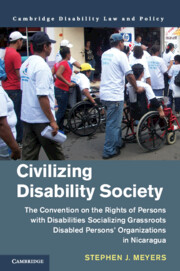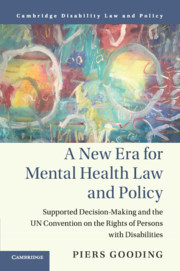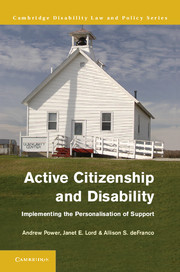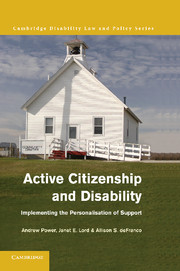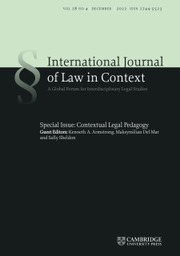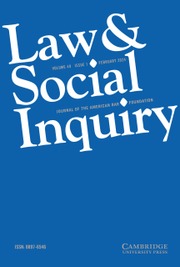Civilizing Disability Society
The United Nations Convention on the Rights of Persons with Disabilities (CRPD) is increasingly used to civilize grassroots disabled persons' organizations (DPOs) around the world. The international disability rights movement actively promotes the CRPD's key norm that disabled persons mobilize in support of their rights under the Convention. The unintended consequence of these activities, however, is that local groups focused on social support and service provision, rather than disability-rights advocacy, are targeted for change. While the resources provided by international actors to grassroots organizations provide new opportunities, they also create barriers to local groups' ability to promote full civic participation of their members in the local community. Through a detailed account of grassroots DPOs in Nicaragua, Civilizing Disability Society demonstrates how local organizations navigate pressures from abroad as they attempt to concretely address the health, education and economic needs of their members at home.
- Investigates the dissemination of human rights from the perspective of grassroots 'rights holders'
- Provides a broad introduction to human rights, organizational sociology, and disability studies theory
- Critiques the emergent trend of including a role for civil society in international human rights law
Reviews & endorsements
'Through an in-depth exploration of the context and narratives of the Nicaraguan disability community, the author provides a unique, interesting and heads on reality check for CRPD implementation and disability rights advocacy in the Global South.' Maya Sabatello, Columbia University, New York
'This fascinating study shines a spotlight on the realities and experiences of Nicaraguan disabled people’s organisations, which are shaped by both the rights-based perspective embedded in the UNCRPD and Nicaragua’s civic participation model of solidaridad. Meyers’ insightful analysis brings to the surface uncomfortable tensions that often exist between Western understandings of human rights and local interpretations, particularly in Southern contexts. This excellent book is highly engaging and surprisingly revealing - a wake-up call for the international disability rights movement and an essential read for anyone who is interested in how best to meet the challenge of implementing disability rights around the globe without alienating disabled people themselves.' David Cobley, University of Birmingham
Product details
May 2022Paperback
9781108446433
192 pages
229 × 152 × 10 mm
0.268kg
Available
Table of Contents
- 1. Spending down a grant
- 2. Inhabiting Nicaraguan civil society at the intersection
- 3. The problem with pretty little programs
- 4. Grassroots members walking and rolling away
- 5. Identity politics as the continuation of war by other means
- 6. Innovation at the crossroads
- 7. The CRPD's civilizing mission.

